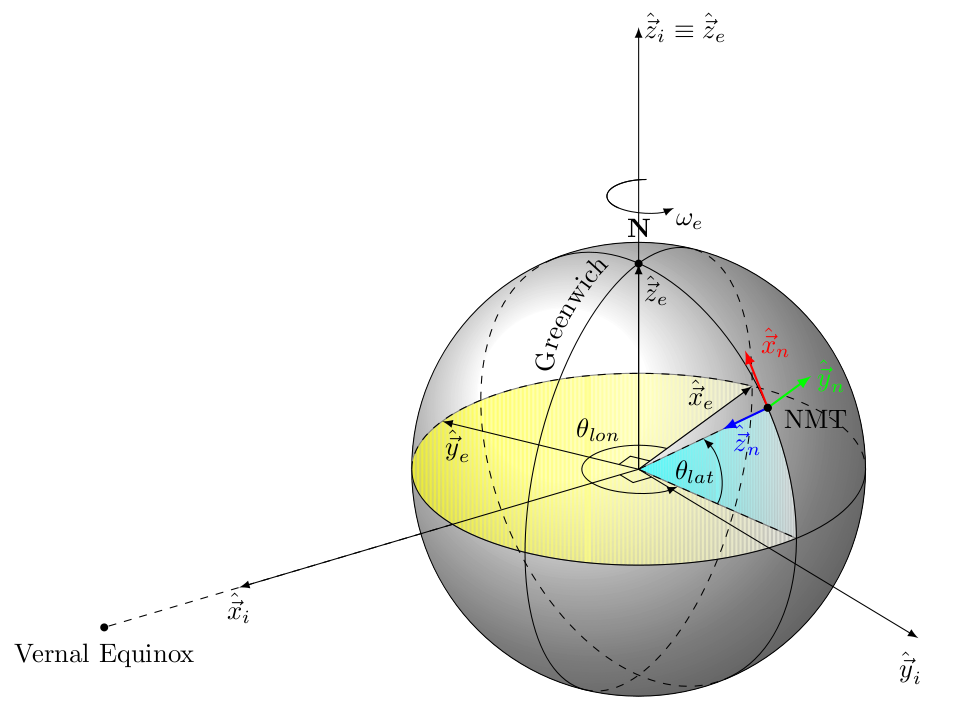| Aided Inertial Navigation Systems |  |
Mini Course Jan. 2nd- 5th, 2018 |
Instructors
|
Textbook:Paul Groves, Principles of GNSS, Inertial, and Multisensor Integrated Navigation Systems, Second Edition, Artech House, 2013.
Software:MATLAB/SIMULINK (2016b preferred) Free 30-Day MATLAB trial
Registration info please email: aly[dot]elosery[at]nmt[dot]edu |
Course Description:This short course will cover the basics of terrestrial location and navigation with an emphasis on practical exposure to the technology. The course is designed for working engineers in the area of navigation. Both simulation development and hardware demonstration will be covered.Key components of the course include: an overview of inertial navigation technology; principles of strapdown inertial navigation systems including coordinate frames, attitude representation, and mechanization in various coordinate frames; sensor technology covering a wide range of accelerometers and gyroscopes; sensor specifications and characterization; testing and calibration approaches; effects of inertial sensor error and compensation methods; and introduction to unmanned systems; analysis of real sensor data and simulation and modeling using MATLAB/Simulink. 

|
Topics Covered:
|
Short Bio: Dr. BruderStephen Bruder, Ph.D., is a subject matter expert in the area of GPS denied navigation with 20+ years of experience and more than 50 peer reviewed publications. He is currently an associate professor at Embry-Riddle Aeronautical University, group lead of the ICARUS research group, and a consultant in the area of aided navigation systems. Dr. Bruder has served as principal investigator on aided navigation projects for MDA, AFRL, NASA, SNL, USSOCOM, and others, to include the development of a GPS denied navigation algorithms for unmanned ground vehicles (SNL) and a satellite based auto-calibrating inertial measurement system (MDA). |
Short Bio: Dr. El-OseryDr. Aly El-Osery received his B.S. in 1997, M.S. in 1998 and Ph.D. in 2002 in electrical engineering from the University of New Mexico. From 1997 to 2002 he was a research assistant at the Autonomous Control Engineering Center at the University of New Mexico. In 2002 he joined the Electrical Engineering Department at New Mexico Institute of Mining and Technology, Socorro, New Mexico and is currently an Associate Professor and Chair of the Electrical Engineering Department. His research interests are in the areas of inertial navigation and RF based aiding sensors, electronic warfare, navwar, multi-agents robotics, wireless communications, control systems, sensor networks and soft computing. He has over 65 journal, book chapters, and conference publications in these areas. He is a senior member of IEEE and several of its societies including Systems Man and Cybernetics Society, and Communication Society. |
Short Bio: Dr. WedewardKevin Wedeward serves as the Dean of Engineering and is a Professor of Electrical Engineering at New Mexico Institute of Mining and Technology (also known as New Mexico Tech). He arrived at New Mexico Tech in 1997 after teaching at the United States Naval Academy, and most recently served as Chair of New Mexico Tech’s Department of Electrical Engineering. His background is in electrical engineering and mechanical engineering, and he teaches courses on robotics, inertial navigation, control systems, power systems, engineering design, circuits and systems. He works on projects related to robots and unmanned vehicles in hazardous environments, security of electric power systems, and integration of renewable energy into the power grid, which have resulted in diverse publications and sponsorship by industry and government. Recently, he co-developed project-based courses focused on space vehicles and robotics for freshmen in anticipation of increasing engagement, and ultimately improving retention and rates of graduation. |